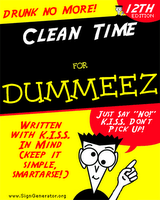According to the Diagnostics and Statistical Manual of Mental Disorders (Fourth Edition),
Addiction is recognized by 3 basic stages:
1. Preoccupation/Anticipation
2. Binge/Intoxication
3. Withdrawal/Negative effect
The following characteristics are typical of each stage:
1. Preoccupation/Anticipation:
Cravings (sometimes constant) and preoccupation with acquiring drugs/alcohol
2. Binge/Intoxication:
Using more of a substance than is necessary, using a substance beyond
experiencing slight intoxicating effects (using beyond calming down, socializing,
or relaxing, and actually getting stoned or drunk instead)
3. Withdrawal/Negative effect:
Experiencing intolerance, withdrawal symptoms, losing motivation for normal
activities in life (hangovers, shakes, planning on partying instead of spending
quality time with family and friends - selecting friends and family who party
while rejecting or ignoring those who do not)
It is believed that addiction has a biological as well as psychological basis
(some will go further and say addiction affects the person and body wholly, also in spiritual and emotional ways - and also that addiction and addicts affect the community).
There are varying opinions, of couse, however, no discipline that I am aware of DISCOUNTS addiction as partly out of control of the addict at advanced stages.
For this reason - it is important for addicts (and those who want to support addicts and see
them recover from addiction) - to realize that a change of behavior (behavior correction) as well as change in thinking/perception will have to occur, on a long-term basis, in order for the addict to get better.
This is not a matter of simply taking away the booze/drugs/substance/habit, and with addictions like food addictions and shopping addictions, it is particularly difficult for some people to improve quickly. Food needs to be eaten, shopping needs to occur, therefore a concerted effort must be made to change habits on many levels.
If you recognize yourself or a loved one who fits one of the stages above, please educate yourself about addiction and recovery. It doesn't matter if you notice someone (or yourself) at only 'stage one' preoccupation/anticipation. Without correction, behaviors, habits, and addiction itself only progresses to the next stages.
On the right side-bar, about half-way down the blog, are recovery organization links, including links for 12-step sexual addiction recovery, phobics, gamblers and other recovery.
Any habit that gets out of hand can become a behavioral and mind problem called addiction.
Please, take care of yourself.
Subscribe to:
Post Comments (Atom)











2 comments:
great post By the way, for alcoholics out there who need to attend AA meetings but couldn’t find one that details the AA schedule, I found a great schedule of AA’s at sober.com. I’m not affiliated with this site, I just want recovering alcoholics out there to find a comprehensive list of AA meetings just in case you are relocating or searching for an AA meeting in your new place. For the complete list of AA meetings, here’s the link: http://sober.com/aa-alcoholic-anonymous-meetings.html
It's very easy to find out any topic on web as compared to textbooks, as I found this post at this web site.
My page: elektronisk cigaret
Post a Comment